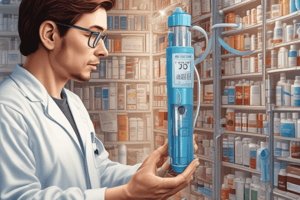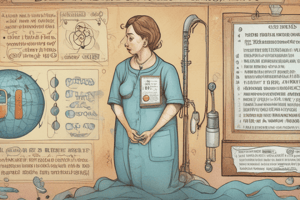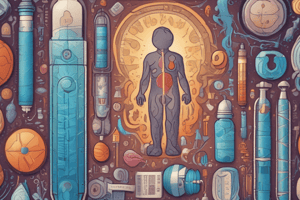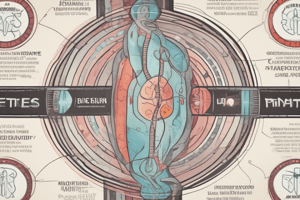Podcast
Questions and Answers
What is a potential result of hyperglycemia in diabetic emergencies?
What is a potential result of hyperglycemia in diabetic emergencies?
What is the defined blood sugar level for hypoglycemia in individuals under 12 years old?
What is the defined blood sugar level for hypoglycemia in individuals under 12 years old?
What common symptom is associated with diabetic ketoacidosis (DKA)?
What common symptom is associated with diabetic ketoacidosis (DKA)?
What should be monitored closely when administering IM glucagon?
What should be monitored closely when administering IM glucagon?
Signup and view all the answers
What is the most common complication arising from a lack of insulin in type 1 diabetes?
What is the most common complication arising from a lack of insulin in type 1 diabetes?
Signup and view all the answers
What is a potential side effect of glucagon when administered for hypoglycemia?
What is a potential side effect of glucagon when administered for hypoglycemia?
Signup and view all the answers
What is a key difference between type 1 and type 2 diabetes?
What is a key difference between type 1 and type 2 diabetes?
Signup and view all the answers
What is the recommended first step in managing diabetic ketoacidosis (DKA)?
What is the recommended first step in managing diabetic ketoacidosis (DKA)?
Signup and view all the answers
What is Addison's disease associated with in terms of adrenal gland function?
What is Addison's disease associated with in terms of adrenal gland function?
Signup and view all the answers
Which statement best describes how insulin functions?
Which statement best describes how insulin functions?
Signup and view all the answers
What role does glucagon play in the body?
What role does glucagon play in the body?
Signup and view all the answers
What is diabetic ketoacidosis?
What is diabetic ketoacidosis?
Signup and view all the answers
Which medication is commonly used to treat hypoglycemia?
Which medication is commonly used to treat hypoglycemia?
Signup and view all the answers
What are the main characteristics of type 2 diabetes?
What are the main characteristics of type 2 diabetes?
Signup and view all the answers
What complications might arise from diabetic ketoacidosis?
What complications might arise from diabetic ketoacidosis?
Signup and view all the answers
Which statement about the prevalence of diabetes types is accurate?
Which statement about the prevalence of diabetes types is accurate?
Signup and view all the answers
Flashcards
Type 1 Diabetes
Type 1 Diabetes
A type of diabetes where the body does not produce insulin.
Type 2 Diabetes
Type 2 Diabetes
A type of diabetes where the body produces insulin but doesn't use it properly.
Insulin
Insulin
A hormone that helps cells absorb glucose from the blood.
Glucose
Glucose
Signup and view all the flashcards
Hypoglycemia
Hypoglycemia
Signup and view all the flashcards
Dextrose
Dextrose
Signup and view all the flashcards
Glucagon
Glucagon
Signup and view all the flashcards
Diabetic Ketoacidosis
Diabetic Ketoacidosis
Signup and view all the flashcards
Hypoglycemia Definition
Hypoglycemia Definition
Signup and view all the flashcards
Hypoglycemia Treatment (no IV)
Hypoglycemia Treatment (no IV)
Signup and view all the flashcards
Diabetic Ketoacidosis (DKA) Cause
Diabetic Ketoacidosis (DKA) Cause
Signup and view all the flashcards
DKA Symptoms
DKA Symptoms
Signup and view all the flashcards
DKA Management
DKA Management
Signup and view all the flashcards
DKA Patient Timing
DKA Patient Timing
Signup and view all the flashcards
Adrenal Insufficiency Cause
Adrenal Insufficiency Cause
Signup and view all the flashcards
Adrenal Insufficiency Description
Adrenal Insufficiency Description
Signup and view all the flashcards
Study Notes
Endocrine Emergencies
- Diabetes is a common disease caused by a dysfunctional pancreas.
- Insulin is needed to convert sugars into energy for the body.
- Diabetes exists in two forms: Type 1 and Type 2.
Type 1 Diabetes
- Individuals with type 1 diabetes do not produce insulin.
- Their bodies' cells cannot absorb sugar for energy.
- Sugar is the main fuel source for cells in the body.
- Cells cannot function without sugar.
Type 2 Diabetes
- Individuals with type 2 diabetes can produce insulin.
- Insulin is not used effectively by the body, known as insulin resistance.
- Most people with diabetes have type 2.
Diabetes Differences
- Type 1 diabetes cannot be prevented or cured.
- Type 1 diabetes requires lifelong insulin injections.
- Type 2 diabetes can sometimes be prevented or managed through lifestyle changes.
- Type 2 diabetes may sometimes require insulin injections.
Insulin
- Insulin is used in type 1 diabetes (and sometimes in type 2).
- Insulin stimulates cells to absorb glucose.
- It lowers blood sugar levels.
- Different types of insulin have various onset and duration times.
Diabetic Emergencies
- Hyperglycemia: high blood sugar, potentially causing ketoacidosis
- Hypoglycemia: low blood sugar, potentially causing seizures or coma
Hypoglycemia
- Defined as a blood sugar level lower than 4mmol/l or 72mg/dl.
- Three types: mild, moderate, and severe.
- Mild to moderate hypoglycemia: patients can treat themselves.
- Severe hypoglycemia requires assistance from a third party (friend, relative or ambulance).
Hypoglycemia Treatment
- Conscious patients: use oral glucose (gel or tablet). Glucose gel is easier to tolerate than glucose tablets.
- Unconscious patients: require parenteral administration of glucose (IV).
- 500 ml pack of 10% solution
- Adults > 12 years: 10 grams IV/IO
- Dose repeated every 5 minutes.
- Maximum dose: 30 grams or 300 ml
- If IV access is not possible, administer IM glucagon.
Diabetic Ketoacidosis (DKA)
- Most common in type 1 diabetes patients.
- Caused by a lack of insulin.
- Insufficient insulin prevents cells from using glucose.
- Glucose levels in the blood rise.
- Starved cells break down fat, producing ketones (acid chemicals).
- Symptoms include increased thirst, increased urination, tachycardia, vomiting, and fruity breath.
DKA Management
- Correct dehydration and acidosis with IV fluids and insulin.
- Fluid replacement needs to be slow.
- Correct conditions (quickly developing) and situations (slowly developing) promptly.
- Only administer fluids if signs of circulatory failure or dehydration exist.
- Symptomatic hyperglycemia (>250 mg/dl or 13.9 mmol/l) requires treatment.
Acute Adrenal Insufficiency
- Adrenal glands are located on top of the kidneys.
- They produce and secrete several important hormones.
- Addison's disease occurs when the body cannot produce sufficient hormones.
- Hydrocortisone is the treatment (preferrably slow IV, IM if IV not accessible).
Drug Revision
- Glucose gel
- Dextrose
- Glucagon
Studying That Suits You
Use AI to generate personalized quizzes and flashcards to suit your learning preferences.
Related Documents
Description
This quiz covers the critical aspects of diabetes, including the distinctions between Type 1 and Type 2 diabetes, their causes, and management techniques. Learn about insulin's role in energy conversion and how lifestyle changes can impact disease management.




